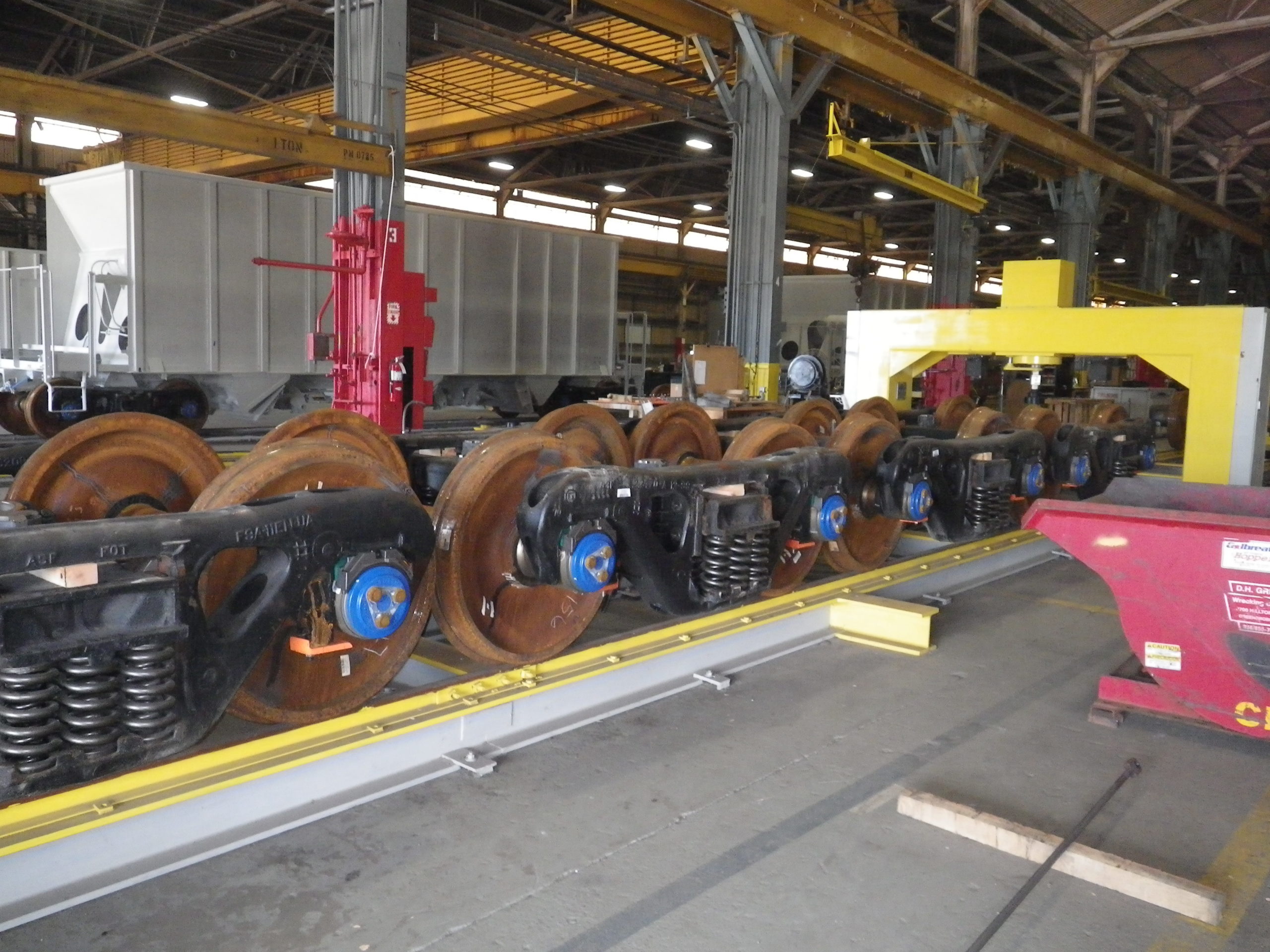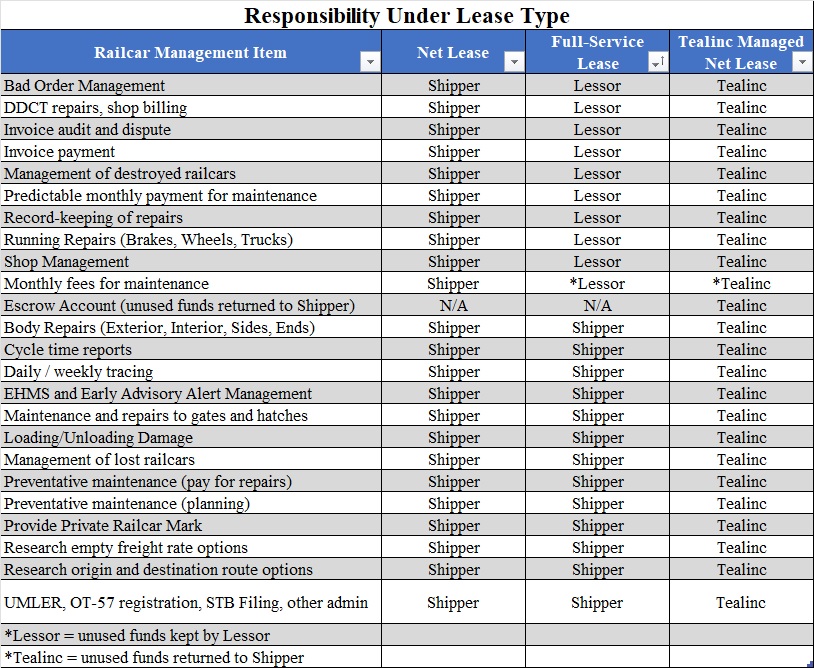When it comes to leasing railcars, structure of the lease is a monumental decision.
Will you lease the railcars under a net lease or a full-service lease? When it comes to the management and repairs of your railcars, most commonly you only have those two options. Both net lease and full-service leases offer distinct advantages and disadvantages, and both can significantly impact a company’s operations and bottom line. There is a third type of lease that Tealinc developed in 2011 called “managed net lease”. This is a hybrid to the net lease and full-service lease option that allows customers’ railcar maintenance, railcar management, and railcar repair needs to be supported like a full-service lease but at the lower cost of a net lease. In this blog, we will explain the options and pros and cons for each so that you can make the best decision for your business needs. Keep in mind, if you own railcars now, you can sell those railcars to Tealinc and lease them back under a managed net lease so you can take advantage of the pros listed herein.
First, some basic definitions:
- Net Lease: When operating under a net lease, the lessee (shipper) is responsible for all maintenance, insurance, transportation, and taxes during the term of the lease. The lessor retains the ownership of the railcar and collects all rent. Except for taxes, the lessee remains responsible for all aspects of the railcar during the term of the lease up until that railcar is returned to the lessor. During the term of the lease, the lessor or car owner has no other responsibilities to pay for the railcars during the term of the lease except for taxes.
- Full-Service Lease: A full-service lease arrangement offers a comprehensive solution that transfers most responsibilities to the lessor; however, there are multiple exceptions. The lessor deflects all responsibility for defects to the gates, hatches, bodies, and damage of the railcars to the lessee. Management of railcars when railcars need repaired are the responsibility of the lessor and done under the lessor’s control. While a home shop that is enroute *may* be established, often times the lessor will dictate that a railcar move to a shop that is in lessor’s network, even if that shop is out of lessee’s route. This can cause the lessee more freight expenses. Additionally, any repairs made to the railcar at the shop that aren’t the lessors responsibility are rebilled to the lessee which can cause conflict between the lessor and lessee and an unforeseen expense to the lessee.
- Managed Net Lease: A managed net lease as offered by Tealinc is a hybrid combination of a net lease and a full-service lease where all maintenance management of the railcars is completed on the lessee’s behalf by Tealinc staff. All responsibilities remain lessee; however, Tealinc manages all items allowing the lessee to continue focusing on their core business.
Here is a chart showing responsibilities under each lease type.
A breakdown of pros and cons for each lease type option is shown below.
Net Lease: A net lease railcar arrangement involves the lessee taking on more responsibilities compared to a full-service lease. Let’s delve into its advantages and disadvantages.
Pros:
- Cost Control: Net lease railcars provide greater cost control as the lessee assumes responsibility for maintenance, repairs, and insurance. This arrangement allows for more flexibility in managing costs according to the lessee’s specific requirements and operational preferences.
- Customization: With a net lease, lessees have the freedom to design and implement preventative maintenance programs, complete on-site repairs (avoid freight costs and down-time to, in, and from a shop), and manage where their railcars are maintained. All while optimizing operational efficiency.
- Safety and Holistic Approach: Railcars can be repaired where and when needed, ensuring that any issue with the railcar from repairs to the gates, hatches, car body, brakes, wheels, trucks, etc. are completed when they need to be completed.
Cons:
- Higher Upfront Costs: Acquiring and maintaining railcars under a net lease can involve higher upfront costs, including handling ongoing maintenance and repairs. Non-planned repairs and maintenance can generate unplanned and unpredictable maintenance costs.
- Operational Burden: As the lessee, you assume the responsibility of managing and coordinating maintenance, repairs, inspections, and insurance. This can be demanding for companies with limited resources or expertise in railcar management.
Full-Service Lease: A full-service lease railcar arrangement offers a comprehensive solution that transfers most responsibilities to the lessor. Let’s examine its advantages and disadvantages.
Pros:
- Assisted Maintenance: Full-service lease railcars alleviate the lessee from managing maintenance, repairs, and other associated tasks. The lessor handles all these responsibilities, allowing the lessee to focus on core operations.
- Lower Upfront Costs: With a full-service lease, businesses can avoid upfront and unpredictable upfront costs which can free up capital for other business needs.
- Expertise and Support: Lessor companies often possess specialized knowledge and expertise in railcar management, ensuring efficient operations, compliance, and regulatory adherence.
Cons:
- Limited Customization: Full-service lease railcars may have limited customization options requiring the lessee to adhere to the lessor’s preferred maintenance shops and providers. Many lessors have contracts or may even own the shop where railcars are sent. Often times these facilities are out of route and require the lessee to pay higher freight invoices.
- Higher Long-Term Costs: Although full-service leases may involve lower upfront maintenance and repair costs, the cumulative expenses over the lease term could be higher than in a net lease due and actual maintenance and repair needs can far exceed what the lessor pays for during the term of the lease.
- Potential Dependency: Relying solely on full-service lease railcars means businesses depend on the lessor for railcar availability and timely maintenance. Any disruptions in service from the lessor or the shop could impact the lessee operations. Often times, the time a railcar spends in the shop will far exceed the planned or estimated time leaving the lessee without needed railcars it so greatly depends on.
Managed Net Lease: A managed net lease railcar arrangement is a hybrid arrangement that allows the pros from both a net lease and full-service lease while alleviating the cons. As such, the list of pros is listed below and accounts for alleviation of all the cons listed above.
Pros:
- Cost Control: A preventative maintenance program can be established with the lessee and railcars can even be repaired on-site by a trusted mobile repair unit which can save the shipper/lessee considerable expense.
- Customization, Safety, and Holistic Approach: To ensure repairs and maintenance expenses are kept low and predictable, at lessee request, Tealinc will set up an escrow account whereby a defined amount of money is paid into the account each month. When Tealinc receives an invoice, Tealinc audits, approves, pays or disputes the invoice on behalf of the lessee. At the end of each month, term, or calendar year, the escrow account is balanced and any unused funds are returned to the lessee. In this capacity, maintenance dollars are paid at actual expense and the lessee retains any upside. All while optimizing operational efficiency. Railcars can be repaired where and when needed ensuring that any issue with the railcar from repairs to the gates, hatches, car body, brakes, wheels, trucks, etc. are completed when they need to be completed.
- Assisted Maintenance: The managed net lease with Tealinc alleviates the lessee from managing maintenance, repairs, and other associated tasks. The lessor handles all these responsibilities, allowing the lessee to focus on core operations.
- Lower Upfront Costs: With a managed net lease, businesses can avoid upfront and unpredictable upfront costs which can free up capital for other business needs.
- Expertise and Support: Tealinc possess specialized knowledge and expertise in railcar management, ensuring efficient operations, compliance, and regulatory adherence.
Tealinc stands ready to partner with you to explore your specific railcar equipment needs, maintenance and management support desires, and rail transportation development goals. Give us a call or send us an email. We’re look forward to earning your business!
Explore Railcar Support Services, Railcar Supply & Railcar Demand with Tealinc
www.tealinc.com | (708) 854-6307 | RailPartner@tealinc.com


